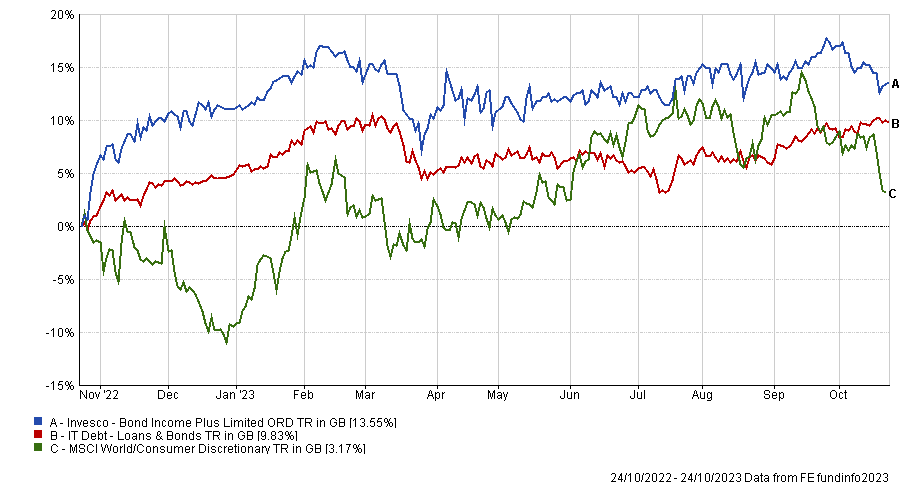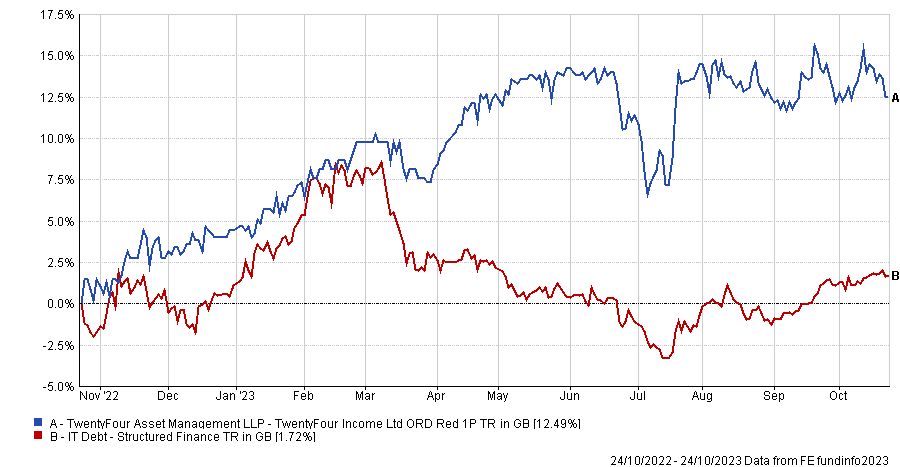The next few years are going to be about balancing income and downside protection, as rates will remain higher for longer and attention will have to shift from inflation to the upcoming recession.
This is the prediction of a panel of fixed income managers who haven’t seen signs of distress in companies earnings just yet, but are sure they will come.
Rhys Davies, manager of the Invesco Bond Income Plus, encouraged investors to focus more on the impact of the tight monetary policy rather than what caused it.
Performance of fund vs sector and index over 1yr
Source: FE Analytics
“It's very easy to be critical of how slow central banks were to respond to inflation last year, but then they’ve started a very aggressive rate hiking cycle and we have to think about the economic fallout from that. That's going to be the main challenge going forward,” he said.
“We're not expecting interest rates to fall as rapidly as they've risen, for multiple reasons. Firstly, central bankers are acutely aware of the mistakes of the past and don't want to repeat them. You'll have to see a lot of pain being developed in the real economy before you start to see interest rates being cut again.”
Despite not seeing great amounts of pain just yet, the manager is bracing for the lagged effect of higher borrowing costs on the economy, as companies, high-yield bond issuance, households and people with mortgages have all built business models and paid for assets around the idea of low borrowing costs.
Aza Teeuwen, manager of the TwentyFour Income Fund, agreed and highlighted even more reasons for concern.
Performance of fund vs sector and index over 1yr
Source: FE Analytics
“We're seeing what's going on in Israel and in Ukraine. Oil is expensive and getting more expensive, core inflation remains high. Our base case 12 months ago was that we'd be in a recession today, but wage growth is healthy, causing even more problems for the central banks, and unemployment is only gradually increasing,” he said.
“I don't think the Bank of England will be quick to cut rates when we get inflation under control. We'll probably look towards a more normal situation altogether to go back to low rates. Things will have to go horribly wrong first before central banks go back into quantitative easing.”
Asked how investors should react to this scenario, Davies recommended thinking about the level of return in excess of inflation that they are after and for that, he would use the breakeven rate on government bonds in the UK, which is 4% inflation over the next 10 years.
“Don't be afraid of investing in the bond market because of what happened last year. There's a lot more yield available today than at the start of 2022, when bonds were not priced for the level of inflation we had,” he said.
“Today, bonds are much better priced for inflation going forward, that's baked into the bond price When you're buying bonds with much higher yields today, you are getting compensated for the risk of inflation and for the risks of surprises.”
Both investment grade and high yield provide opportunities.
The former might “not be the most exciting part of the market right now”, but can be considered a yield product, which it wasn’t two years ago. As an example, he gave General Motors’ two-year bond in sterling, which is is yielding 6.5%.
For high yield, the manager spoke of a pre-2022 and post-2022 world.
“Pre 2022, high-yield bonds would be an issue, with coupons in some cases as low as 2%-4%, but now that same company issuing the same bond will be paying two or three times the amount,” he said.
“For example, BT issued a bond last month to pay a 8.38% coupon, and that’s pretty attractive. We're really excited about is this new world looking forward.”
Davies also mentioned cash as “not a bad place to hide out for a year”.
“If you don't quite know what to do, then about 5% or so from cash while you figure it out, is probably going to be okay,” he said.
Finally, Teeuwen recommended short term high-income, but with a caveat.
“I like short-dated high-yield bonds, I’m a big fan,” he said.
“However, don't be buying bucket loads of CCC or CCC- bonds or aggressive equities. Inflation has risks to the real economy and in all reality, we should be very much aware of that,” he concluded.




